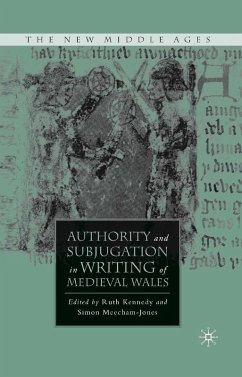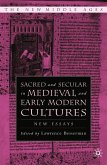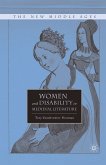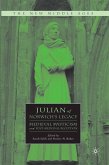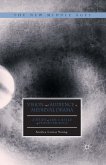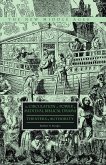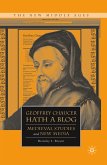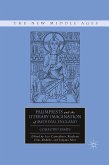The conquest of Wales by the medieval English throne produced a fiercely contested territory, both militarily and culturally. Wales was left fissured by frontiers of language, jurisdiction and loyalty - a reluctant meeting place of literary traditions and political cultures. But the profound consequences of this first colonial adventure on the development of medieval English culture have been disregarded. In setting English figurations of Wales against the contrasted representations of the Welsh language tradition, this volume seeks to reverse this neglect, insisting on the crucial importance of the English experience in Wales for any understanding of the literary cultures of medieval England and medieval Britain.
Dieser Download kann aus rechtlichen Gründen nur mit Rechnungsadresse in A, B, BG, CY, CZ, D, DK, EW, E, FIN, F, GR, HR, H, IRL, I, LT, L, LR, M, NL, PL, P, R, S, SLO, SK ausgeliefert werden.
"These chapters should prove extremely useful to scholars of medieval English literature and culture who are interested in Wales and the Welsh - or, in the spirit of Meecham-Jones's provocative contribution, for all scholars of medieval English literature, who really should know a bit more about what was going on to the west of Offa's Dyke." - Speculum
"The New Middle Ages series edited by Bonnie Wheeler has produced some of the most innovative and exciting publications on medieval topics out there on the market today; this volume is a worthy addition to the list." - The Medieval Review
"What is wonderful and absolutely new about this collection is that it looks at the Wales-England nexus from both sides at once. No comparable volume is similarly Janus-faced. This collection of essays underscores the obvious but overlooked fact that it is essential to have Celticists be primary contributors to the interdisciplinary conversation unfolding over what a postcolonial Middle Ages means. A smart, insightful book that ought to be widely read." - Jeffrey Jerome Cohen, Professor and Chair of English , George Washington University
"Setting out to remedy the invisibility of Wales in medieval English culture in the union of unequal respect that has persisted ever since the forced absorption of Wales into England, it highlights under-commented connections, such as that the largest concentration of urban Welsh was in London; it looks at the consequences of missing evidence, especially in respect of manuscripts; it offers a reconsideration of the inequalities of conquest, as in the three systems of law; and it is full of small delights, such as Trevisa s account of the homing-stone of Anglesey that sweats if anyone doth lechery too close to it." - Helen Cooper, Professor of Medieval and Renaissance Literature, University of Cambridge
"This is a superb collection of original pieces on Wales in the Middle Ages, offering long-overdue perspectives not only on how Welsh people saw and understood themselves in a period when their identity was constantly being contested and negotiated, but also on how the English viewed their obstinately different and resilient neighbors. It is full of fresh insights on the literary and visual culture of Wales in the period, but also seeks-very successfully-to explain how this culture made possible the persistence up to the present of the idea of the Welsh nation. This ground-breaking work, fascinating in itself, but full of insights into some very broad questions around national identity and cultural continuities, is a major contribution to mediaeval studies and to Welsh historiography alike." - The Most Reverend and Right Honourable Rowan Williams, Archbishop of Canterbury
"History is not always written by the victor," as Helen Fulton observes in Kennedy and Meecham-Jones' superb new volume of essays . . . it is one of the great virtues of the collection that almost without exception, the authors represented in it refuse to simplify the constructions they describe in the interests of any particular theoretical or political agenda . . . The New Middle Ages series edited by Bonnie Wheeler has produced some of the most innovative and exciting publications on medieval topics out there on the market today; this volume is a worthy addition to the list." - The Medieval Review
"The New Middle Ages series edited by Bonnie Wheeler has produced some of the most innovative and exciting publications on medieval topics out there on the market today; this volume is a worthy addition to the list." - The Medieval Review
"What is wonderful and absolutely new about this collection is that it looks at the Wales-England nexus from both sides at once. No comparable volume is similarly Janus-faced. This collection of essays underscores the obvious but overlooked fact that it is essential to have Celticists be primary contributors to the interdisciplinary conversation unfolding over what a postcolonial Middle Ages means. A smart, insightful book that ought to be widely read." - Jeffrey Jerome Cohen, Professor and Chair of English , George Washington University
"Setting out to remedy the invisibility of Wales in medieval English culture in the union of unequal respect that has persisted ever since the forced absorption of Wales into England, it highlights under-commented connections, such as that the largest concentration of urban Welsh was in London; it looks at the consequences of missing evidence, especially in respect of manuscripts; it offers a reconsideration of the inequalities of conquest, as in the three systems of law; and it is full of small delights, such as Trevisa s account of the homing-stone of Anglesey that sweats if anyone doth lechery too close to it." - Helen Cooper, Professor of Medieval and Renaissance Literature, University of Cambridge
"This is a superb collection of original pieces on Wales in the Middle Ages, offering long-overdue perspectives not only on how Welsh people saw and understood themselves in a period when their identity was constantly being contested and negotiated, but also on how the English viewed their obstinately different and resilient neighbors. It is full of fresh insights on the literary and visual culture of Wales in the period, but also seeks-very successfully-to explain how this culture made possible the persistence up to the present of the idea of the Welsh nation. This ground-breaking work, fascinating in itself, but full of insights into some very broad questions around national identity and cultural continuities, is a major contribution to mediaeval studies and to Welsh historiography alike." - The Most Reverend and Right Honourable Rowan Williams, Archbishop of Canterbury
"History is not always written by the victor," as Helen Fulton observes in Kennedy and Meecham-Jones' superb new volume of essays . . . it is one of the great virtues of the collection that almost without exception, the authors represented in it refuse to simplify the constructions they describe in the interests of any particular theoretical or political agenda . . . The New Middle Ages series edited by Bonnie Wheeler has produced some of the most innovative and exciting publications on medieval topics out there on the market today; this volume is a worthy addition to the list." - The Medieval Review

